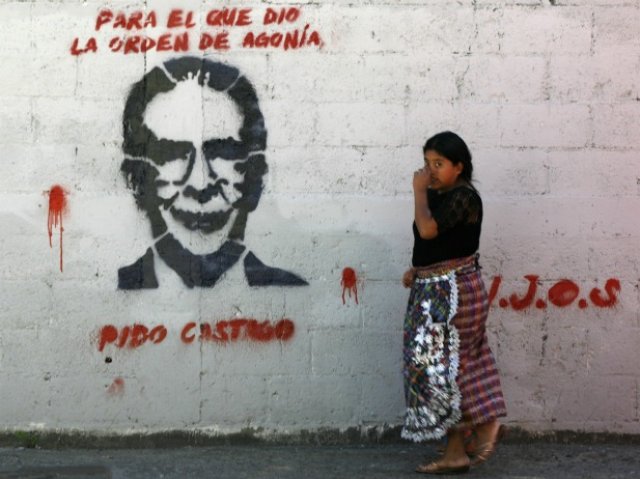
Former Guatemalan dictator Efrain Rios Montt will finally face prosecution for his crimes.
After a year of house arrest, Montt became the first former head of state to be charged with genocide in a Latin American court on January 28.
The prosecution believe they have compelling evidence that Montt led a campaign to ethnically cleanse the Central American state of its indigenous Mayan population.
Though he is being charged in relation only to the deaths of 1771 Mayans, about 200,000 people were killed or went missing during Guatemala's 1960-96 civil war.
In 1999, a UN sponsored truth commission found that after Montt seized power in a coup in March 1982, his administration presided over the most intense period of the genocide against the Mayan people. Montt believed they were backing the country's left-wing rebels.
The 17 months that Montt was in power are often considered the most intense period of the civil war.
Until January 14 last year, he had immunity from prosecution as a serving congressman.
Human rights organisations were quick to express approval of the long awaited indictment. Amnesty International described the decision as “a crucial step towards justice, truth and reparation”.
If Montt is convicted of crimes against humanity, it will be a huge victory for social justice in the region. But it will be a far cry from justice for Guatemalans who continue to suffer oppression and exploitation.
The day after Montt was charged, Guatemalans rallied in the capital, demanding the government provide land for 769 Mayan campesino (small rural landholder) families.
The campesinos were pushed off their land in Alta Verapaz in 2011. Witnesses say the police and military assisted private security officers in burning their homes and crops.
The government justified the attack as part of counter-insurgency operations, but later promised to compensate the families.
In December, indigenous activists marked the end of the Mayan calendar with a rally outside the Tikal ruins. They protested against the ongoing systemic poverty afflicting their communities.
Last October, seven Mayans were killed and 34 wounded when security forces opened fire on protesters near Totonicapan.
Community leaders have also been targeted for assassination. Anti-mining activist Yolanda Oquely Veliz was shot last June after protests against a mine operated by a subsidiary of Canadian company Radius Gold Inc.
Mining companies Goldcorp Inc, Tahoe Resources, Hudbay Mineral and Skye Resources, among others, have been accused by activists of damaging the environment and in some cases supporting serious human rights violations.
Some of these mining companies operate on land granted to them by the military government that overthrew the progressive Arbenz government in 1954. Successive governments sold large swaths of the countryside to foreign corporations.
Despite the forced evictions and mass murders, the US provided aid to successive military regimes.
In the past decade, foreign companies (mostly US and Canadian mining corporations) were granted hundreds of new concessions to operate on Mayan land.
The truth commission found that through the 1970s and 80s, some of these companies collaborated with the military in its genocide.
Foreign mining companies are still being accused of involvement in human rights abuses.
In 2007, HudBay Minerals was forced to defend itself in three separate lawsuits launched in Canadian courts. One case arose from the rape of eleven women during a forced eviction, another involved the murder of an indigenous community leader.
Annie Bird and Grahame Russell of Canadian-based Rights Action wrote in 2010: “Mining companies operate, in Guatemala, with next to complete impunity. The legal system in Guatemala is weak, at best, and corrupted, at worse.”
Many of these companies habitually whitewash environmental and human rights concerns, making it difficult for indigenous voices to be heard abroad.
One example can be found in the supposedly independent Human Rights Impact Assessment of Goldcorp's Marlin Mine in San Miguel, Ixtahuacan.
After being entirely funded by Goldcorp, the study unsurprisingly found that the strip mine was operating in a “responsible” manner.
An independent report, however, found that a nearby river was contaminated. Local activists have reported receiving death sentences and being shot at.
Amnesty International describes Guatemala today as a country “crushed by the rule of impunity, as well as extreme social inequality”.
Oxfam said half of indigenous children “suffer from chronic undernourishment”.
The United Nations Development Programme found in 2006 that 6.6 million Guatemalans lived in poverty; 2 million suffered extreme poverty.
On the other hand, at the turn of the century 2% of the population owned more than 70% of the land. Guatemala is one of the most economically unequal in the world.
Allowing foreign corporations to take more land from some of the world's poorest people makes the situation worse.
The prosecution of Montt may be a step in the right direction, but it is a small one in a country riddled with extreme injustices.
